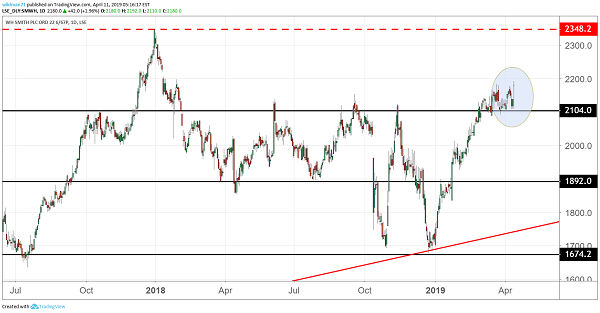
WH Smith: High-flyer divides City
By Graeme Evans from interactive investor.
Latest results are fuel for another assault on a record high. Here’s why Smith splits the Square Mile.
With £1 billion worth of dividends or buybacks since 2007, WH Smith (LSE:SMWH) shareholders can have few complaints about the retailer’s tried and tested strategy when it comes to selling stationery, sweets and magazines.
Shares are up more than 400% over the 12-year period, with the FTSE 250 stock currently within sight of the record high of 2,348p set in December 2017. As well as its trademark focus on margins and cash generation, the chain’s robust performance has been driven by a relentless expansion into travel locations ranging from airports to motorway service areas.
Whereas the travel division generated 21% of revenues in April 2007, this area accounted for 52% of all sales in today’s interim results. And following on from the acquisition of US airports-based digital accessories business InMotion last November, some analysts think it won’t be long until the traditional high street arm is the one accounting for 25% of business.
The potential to expand the successful travel operation into overseas locations has given fresh impetus to shares, with today’s figures for the division showing a 18% jump in total revenues and a 7% improvement in profits to £44 million. In contrast, sales for the high street arm were down 1% and by 4% to £48 million for profits in its seasonally busier half year.

Source: TradingView Past performance is not a guide to future performance
The InMotion acquisition has doubled the size of the Smiths business outside of the UK, with the international travel arm now boasting 425 units and a presence in 99 airports and 30 countries. It secured a further 21 units in the period, with two InMotion units in Australia and Spain.
The Florida-based new addition, which cost £155 million, is performing strongly and should also offer WH Smith an attractive platform for growth in the digital accessories sector. Group revenues and profits would have been £32 million and £2 million higher had InMotion been included from the start of the financial year.
As it happened bottom-line profits were down 21% to £65 million, partly due to one-off costs in relation to InMotion. Underlying earnings per share were broadly flat at 60.6p, with the interim dividend up 8% to 17.2p.
WH Smith said this meant it had now returned over £1 billion of cash to shareholders since 2007, having increased its dividend every year and reduced its issued share capital by 40%. This includes £25 million of the £50 million rolling share buyback programme announced in October.
Peel Hunt increased its price target on the stock to 2,550p in the wake of today’s results. They called InMotion a “real game-changer” and said there was also high quality growth coming from the wider travel business.
Revenues in the UK travel arm were up 3% on a like-for-like basis, driven by 4% growth in the airport shop estate. As the division approaches its busiest time of the year, investors will be wary about the impact of Brexit and economic uncertainty after easyJet (LSE:EZJ) recently issued a profits warning due to softer ticket sales in the UK and Europe.
While weaker consumer confidence could also hinder the core high street business, the company said today’s half-year results were the division’s second-best sales performance of the past decade.
Full-year profit for the high street arm is expected to be in line with last year, while the travel division is likely to be slightly stronger than forecast. UBS are more cautious about prospects, with the broker holding a “sell” recommendation and 1,675p price target.
These articles are provided for information purposes only. Occasionally, an opinion about whether to buy or sell a specific investment may be provided by third parties. The content is not intended to be a personal recommendation to buy or sell any financial instrument or product, or to adopt any investment strategy as it is not provided based on an assessment of your investing knowledge and experience, your financial situation or your investment objectives. The value of your investments, and the income derived from them, may go down as well as up. You may not get back all the money that you invest. The investments referred to in this article may not be suitable for all investors, and if in doubt, an investor should seek advice from a qualified investment adviser.
